The Naked Island Blu-ray Movie
HomeThe Naked Island Blu-ray Movie 
裸の島 / Hadaka no shimaCriterion | 1960 | 97 min | Not rated | May 17, 2016
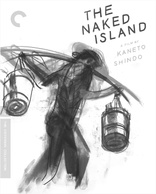
Movie rating
8.1 | / 10 |
Blu-ray rating
| Users | 0.0 | |
| Reviewer | 4.5 | |
| Overall | 4.5 |
Overview
The Naked Island (1960)
The film depicts a small family, a husband and wife and two sons, struggling to get by on a tiny island in the Seto Inland Sea, over the course of a year. They are the island's only occupants, and survive by farming. They must repeatedly carry the water for their plants and themselves in a row boat from a neighboring island...
Starring: Nobuko Otowa, Taiji Tonoyama, Shinji Tanaka, Masanori HorimotoDirector: Kaneto Shindô
| Foreign | Uncertain |
| Drama | Uncertain |
Specifications
Video
Video codec: MPEG-4 AVC
Video resolution: 1080p
Aspect ratio: 2.35:1
Original aspect ratio: 2.35:1
Audio
Japanese: LPCM Mono (48kHz, 24-bit)
Subtitles
English
Discs
50GB Blu-ray Disc
Single disc (1 BD)
Playback
Region A (locked)
Review
Rating summary
| Movie | 5.0 | |
| Video | 4.5 | |
| Audio | 4.5 | |
| Extras | 4.0 | |
| Overall | 4.5 |
The Naked Island Blu-ray Movie Review
Reviewed by Dr. Svet Atanasov April 13, 2016Winner of the Grand Prix at the Moscow International Film Festival, Kaneto Shindo's "Hadaka no shima" a.k.a. "The Naked Island" (1960) arrives on Blu-ray courtesy of Criterion. The supplemental features on the disc include an original trailer for the film; video introduction by director Kaneto Shindo; archival audio commentary with Kaneto Shindo and composer Hikaru Hayashi; new video interview with actor Benicio Del Toro; and new video interview with film scholar Akira Mizuta Lippit. The release also arrives with an illustrated leaflet featuring an essay by film scholar Haden Guest. In Japanese, with optional English subtitles for the main feature. Region-A "locked".
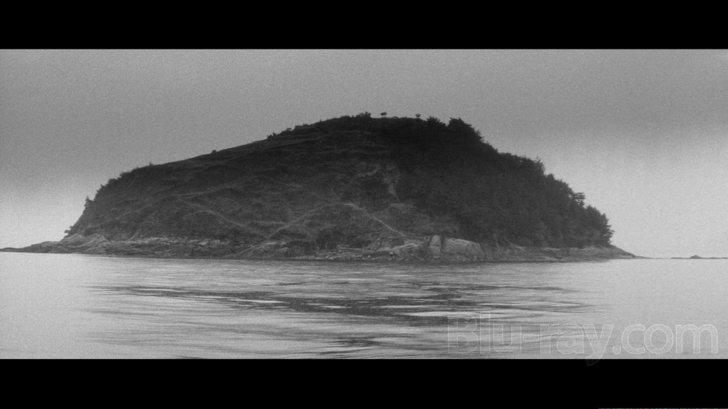
The island
The film follows closely a family of four living on a small island in the Setonaikai archipelago. The place is indescribably beautiful but lonely. It almost seems like it exist in a different era -- there is no drinking water, electricity, or another human being the father (Taiji Tonoyama), the mother (Nobuko Otowa) and their two boys (Shinji Tanaka and Masanori Horimoto) can talk to.
Each day the father and the mother make multiple trips to a larger neighboring island where they collect fresh water in large buckets and then bring them back home. The buckets are so heavy that carrying them up the hill seems like a cruel punishment. But the plants in the fields next to the shack where the family lives have to be irrigated -- the family’s survival depends on them.
The boys try to help as much as they can. When it is time to eat, they bring the food to the table and later on quickly clean up. The boys would also go fishing while their parents are away. The mother occasionally takes one of the boys to the larger island where he goes to school. The few sequences where he patiently waits for her boat to appear and take him back home are amongst the most beautiful in the entire film.
There are two major events in the film that disrupt the family’s daily routine. First, one of the boys catches a rather big fish. The whole family then heads to the larger neighboring island to sell the fish. It isn’t easy, but eventually they get a good deal on it in a small deli. With the money the father is paid the family has lunch in a modest eatery. Later on, each boy gets a gift from the mother -- a plain white shirt.
The second event is a tragedy that changes everything -- at least for awhile. Then everything goes back to normal.
Kaneto Shindo’s Hadada no shima a.k.a. The Naked Island might be one of the purest and most beautiful Japanese films ever made. It is almost completely devoid of dialog -- the first time the father utters a word is well after the forty-minute mark -- but it allows the viewer to completely immerse into the primitive world of contrasts where the family struggles to survive and share their pain and joy. All of this is done without even a whiff of melodrama, without even a hint of politicizing.
The camera carefully observes the family, but Shindo’s technique has little in common with the manner in which the great Yasujiro Ozu observes the main protagonists in his films. In Ozu’s films space and positioning are of utmost importance, while camera movement is extremely limited. In Naked Island there is a sense of freedom that permeates the entire film, but also a feeling that things are as they are because life is a repetitive series of cycles. The film simply chronicles a few of these cycles as experienced by the family on the lonely island.
Naked Island was shot with a very small budget but cinematographer Kiyomi Kuroda's lensing is quite extraordinary. The beautiful panoramic shots from the island, in particular, are simply stunning. There are a few panoramic shots with the mother in a small boat slowly approaching the larger island that are also incredibly beautiful. (Shindo and Kuroda also collaborated on the equally atmospheric Onibaba and Kuroneko).
The calming soundtrack that complements the striking visuals in The Naked Island was created by Hikaru Hayashi (Kinuyo Tanaka’s Love Under the Crucifix, Mikio Naruse’s The Stranger Within a Woman).
The Naked Island Blu-ray Movie, Video Quality 
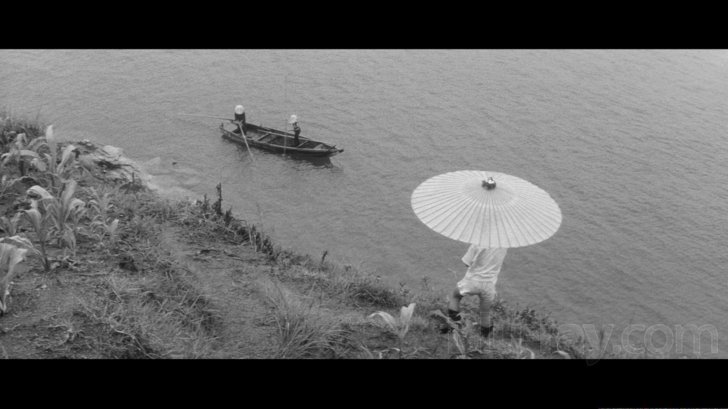
Presented in its original aspect ratio of 2.35:1, encoded with MPEG-4 AVC and granted a 1080p transfer, Kaneto Shindo's The Naked Island arrives on Blu-ray courtesy of Criterion.
The following text appears inside the leaflet provided with this Blu-ray release:
"This new high-definition film transfer was created on a Spirit 4K DataCine from a new 35mm print struck from the original camera negative. Thousands of instances of dirt, debris, scratches, and splices were manually removed using MTI Film's DRS, while Digital Vision's Phoenix was used for small dirt, grain, noise management, flicker, and jitter.
Transfer supervisor: Maria Palazzola.
Colorist: Sue Gates/Modern VideoFilm, Los Angeles."
The basics characteristics of presentation are very similar to those of the Region-B release which reviewed in 2013. Aside from the different framing the brightness levels are managed slightly better and as result there is a wider range of blacks and grays, but the difference is fairly small. Depth and clarity are excellent. Fluidity is also very good. There are no traces of problematic degraining adjustments. There are no traces of sharpening adjustments either. Overall image stability is excellent. A few tiny vertical lines remain, but large debris, cuts, damage marks, and other age-related imperfections have been carefully removed. My score is 4.75/5.00. (Note: This is a Region-A "locked" Blu-ray release. Therefore, you must have a native Region-A or Region-Free player in order to access its content).
The Naked Island Blu-ray Movie, Audio Quality 
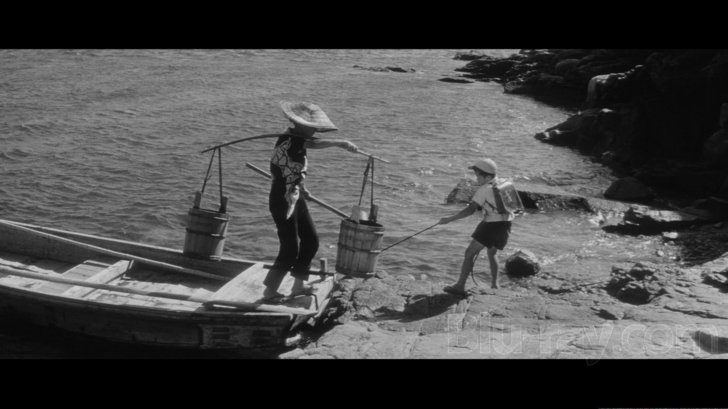
There is only one standard audio track on this Blu-ray release: Japanese LPCM 1.0. Optional English subtitles are provided for the main feature. When turned on, they appear inside the image frame.
There is very little dialog in the film. However, there is a very special soundtrack that greatly enhances the period atmosphere. Dynamic intensity is modest, but separation, clarity and balance are excellent. There are no audio dropouts, hiss and crackle, or digital distortions to report in our review.
The Naked Island Blu-ray Movie, Special Features and Extras 

- Trailer - original trailer for The Naked Island. With music and Japanese text and optional English subtitles. (3 min, 1080p).
- Kaneto Shindo - presented here is a segment from a video which Kaneto Shindo recorded as a greeting for The Urge of Survival, a 2011 retrospective of his work at the Brooklyn Academy of Music. The director quickly explains how he was inspired to shoot The Naked Island. The retrospective was organized by Benicio Del Toro, a great admirer of Kaneto Shindo and his work. In Japanese, with optional English subtitles. (8 min, 1080i).
- Benicio Del Toro - in this new video interview, Benicio Del Toro recalls how he discovered the films of Kaneto Shindo and the incredible impact they had on him, and discusses The Naked Island, its pacing and visual style, the different dilemmas its protagonists face, and a meeting he had with the director shortly before he died. The interview was conducted exclusively for Criterion in Los Angeles in February 2016. In English, not subtitled. (8 min, 1080p).
- Akira Mizuta Lippit - in this new video interview, film scholar Akira Mizuta Lippit discusses the socio-political environment in Japan during the 1960s, the impact Akira Kurosawa's films had on the Japanese film industry (especially after the international success of Rashômon), Kaneto Shindo's early work as an assistant director to Kenji Mizoguchi (Sansho the Bailiff) and his influence on his work (similar treatment of female characters), some of the key themes that define his film, the production history of The Naked Island, important scenes from the film and the context in which they were shot, etc. The interview was conducted exclusively for Criterion in Los Angeles in February 2016. In English, not subtitled. (18 min, 1080p).
- Commentary - this audio commentary initially appeared on British label Eureka Entertainment's R2 DVD release of The Naked Island. It was recorded in Japan in 2000 and features director Kaneto Shindo and his longtime composer and friend Hikaru Hayashi. In Japanese, with optional English subtitles.
- Leaflet - an illustrated leaflet featuring an essay by film scholar Haden Guest.
The Naked Island Blu-ray Movie, Overall Score and Recommendation 
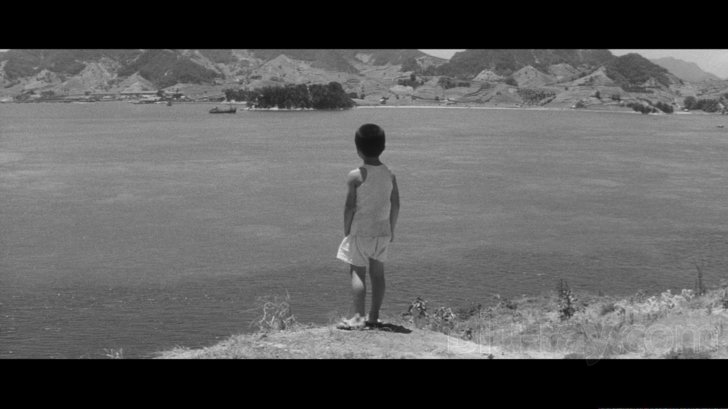
Kaneto Shindo's The Naked Island might be one of the purest and most beautiful Japanese films ever made. Its poetic freedom and elegance are as striking as those witnessed in the films of Michelangelo Antonioni, Mikhail Kalatozov, and Miklos Jancso. The film looks gorgeous on Blu-ray and it should not be missed by fans of classic Japanese cinema. VERY HIGHLY RECOMMENDED.
Similar titles
Similar titles you might also like

24 Frames
2017

Leviathan
Левиафан / Leviafan
2014

Woman in the Dunes
砂の女 / Suna no onna
1964

Maborosi
幻の光 / Maboroshi no hikari
1995

Zama
2017

Aquarius
2016

The Love of a Woman
L'amour d'une femme
1953

La Strada
1954

Loveless
Нелюбовь / Nelyubov
2017

Port of Call
Hamnstad
1948

The Fool
Дурак / Durak
2014

The Valley (Obscured by Clouds)
La Vallée
1972

La Dolce Vita
1960

Compartment No. 6
Hytti nro 6
2021

Elena
Елена
2011

Touki Bouki
1973

Early Summer
麥秋
1951

Sansho the Bailiff
山椒大夫 / Sanshô dayû
1954

A Fantastic Woman
Una mujer fantástica
2017

Mustang
2015